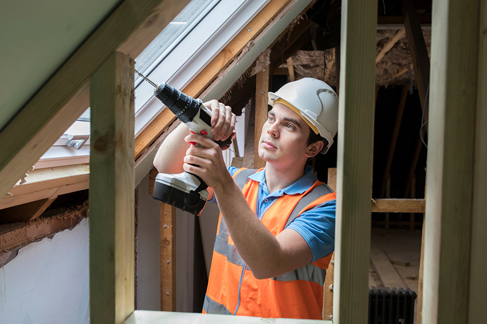
How should I choose and work with a builder on my home improvements?
Project type
Choose a builder
Once you have agreed exactly what you want to build or change, you will need to choose a builder or contractor to turn your plans into reality. You might use one firm or main contractors, for all the work or choose to project manage the scheme yourself and employ sub-contractors. You, or your builder, will also need to find and employ contractors for unregulated work like internal wall tiling, decorating or flooring.
Many people worry whether the builder they have chosen is reputable and competent. When choosing a builder ask for references from someone they’ve carried work out for.
You may decide to select a builder or contractor who is a member of a trade body or association. If contractors claim they are members of a trade association, always check their credentials. It’s simple to do and will only take a few minutes of your time on the phone or the internet.
This isn’t compulsory but if you are new to an area or have no one to ask locally for recommendations, using a trade body to find a builder may give you peace of mind.
Some associations regularly monitor or vet their traders and check out their financial credentials and insurance provisions. Others simply charge a membership fee and don’t carry out any checks.
You can find many UK Trade Associations here https://builduk.org/members/trade-association-members/ or here https://www.designingbuildings.co.uk/wiki/Construction_industry_institutes_and_associations_A_to_F.
There are also schemes like Checkatrade and Rated People.
Once you've narrowed your list of builders down
- Get quotes for the work. Ideally try to get at least three quotations and use the plans that your designer has drawn up for you, so get plenty of copies to give out. Using detailed plans and specifications that have building regulations approval will help you builder to quote accurately, avoiding nasty surprises later on.
- Ask them about their relationship with your local building control team. This should be a positive relationship and good builders are happy to have regular inspections from building control. You can ask your local surveyor to keep you involved in the inspection process and provide brief updates following inspections. (Remember that you're ultimately responsible for building regulations compliance so this is very important.)
- Confirm what they need to carry out the project successfully; consider what you are prepared to be inconvenienced by, and whether these are in the quote provided or hidden extras you may have to pay for later.
- Take photographs of the property both before and after the work: this will give you a stronger case if you have a dispute with your contractor about workmanship or damage etc.
Things to agree with your builder before work starts
- The 'scope of work' - a document/s which details item by item what work will be carried out, when, the materials that will be used and how the work is going to be carried out. This will help protect you and your builder by minimising the risk of mistakes and misunderstandings further down the line. (Ask questions if you aren't clear on any of the details.)
- Hours and work days. For example, you may have asked them to start work after 8.30am to enable the household to prepare for the day, or may prefer them not to work at weekends. If this isn't followed you should remind them what was agreed and ask them to follow that. If hours weren't previously agreed, just have a conversation and try to reach a compromise.
- Duration of work - agree in advance the duration and likely completion date for the work and whether any penalties will be put in place if the builder doesn't achieve these targets.
- Be specific if you want a particular tile or light fitting and agree who will supply them.
- Access into and around the property (security, parking, deliveries, storage of materials, areas for contractors to access to be able to carry out the work).
- Toilet facilities.
- Water and electric services for equipment and processes.
- Removal of refuse and waste storage - hopefully much of this can be minimised and recycled but a certain amount will need to be stored safely on site and then removed using a registered waste carrier. (You can check if the carrier is registered on the Environment Agency website.)
- If the skip is placed on land adjacent to the road then you should check with your local authority highways team for any consent.
- Repair for damage to your land and property and your neighbour’s property.
- Check that they have accident and personal liability insurance: If not, you may be liable for any injuries/damage caused by your contractor.
- Make it clear to your builder before you start work that you expect to receive copies of all certificates, such as building regulations approval or Building Notice acceptance, electrical and gas certificates, warranties, guarantees and instructions on how to use your ventilation system, fire alarm and detection system and Completion Certificate.
Payments
Agree the stages of payment and don’t give an up-front deposit or an initial payment to purchase materials and agree in advance who is buying them. Most reputable builders have accounts with building material suppliers and will only begin to incur charges after materials have been delivered. It's usually cheaper for them to buy them as they might get trade discounts.
Invoices are normally issued on a monthly or quarterly basis depending on the size of the contractor/supplier.
Agree on whether it's going to be bank or cash work.
Although there are no legal consequences for paying your builder in cash as it's a perfectly legitimate transaction, it can cause problems and limit your options for redress.
Without proof of the services carried out, or payments made, it can be extremely difficult to rectify any defects or poor workmanship or take action against the builder. For example, if they abandon your job or their company or business goes bust before the work is completed, or during your defects period.
Always ask for receipts and proof of payment in writing. Without these you have no evidence to support any claims.
VAT
If your builder purchases materials they will usually be liable to pay VAT on top of this and the cost will be passed to you.
If you decide to purchase materials yourself, be aware that it will be your responsibility to resolve any problems with the retailer or supplier if products are faulty or unsatisfactory quality - for example, if you purchase a boiler that develops a fault. Provided your installer has carried out the work correctly then they are in the clear. Generally you will need to do the legwork to find out who is responsible for the failure.
Some builders will ask you to pay all cash in hand.
By buying materials in cash and paying all their subcontractors and casual labour in cash they may be aiming to:
- Avoid putting payments through their bank account that might alert HMRC.
- Avoid paying tax and VAT on the labour element.
Neither are in your best interests if HMRC start an investigation halfway through your project.
CITB levy
The Construction Industry Training Board (CITB) charge builders a levy partly based on their wage bill. This CITB levy is used to train apprentices in the construction industry and improve safety training. By paying as many people as possible in cash some builders aim to avoid this levy.
PI insurance
Your builder should have public liability insurance. The cost of this is partly based on turnover so by not declaring all of this, their premiums tend to be lower. They may not even have valid insurance. This will not help you if you need to make a claim against them and discover they are underinsured.
Advances
Your builder may ask you for an advance or up-front payments. Be aware that most builders’ merchants require their accounts to be settled at the end of the month following the month of invoice, so any requests for payment prior to the goods’ delivery must be questioned.
- Does your builder not have a good credit rating?
- Are they buying materials from a bona fide source?
- Do your materials actually meet the agreed specification or approved plan?
There may be times when, for example, a plumber will ask for money upfront to pay for a special item such as a boiler. This is fair but if you’re unsure, you could offer to purchase it yourself.
If goods are made to order for you, such as a timber frame, then it’s reasonable for the manufacturer to ask for a large payment upfront. Here the safest option is to pay the money into a client’s or escrow account, where it can’t be withdrawn until the goods are delivered.






